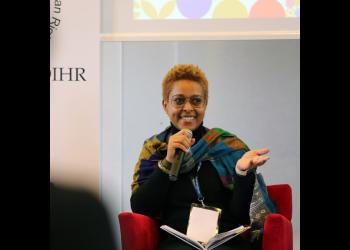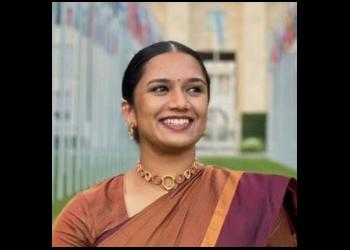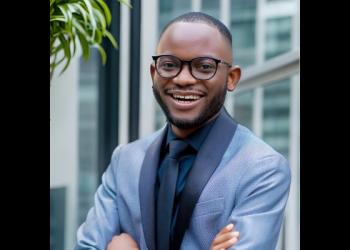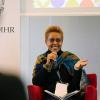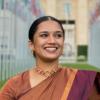Calling for an intergenerational conversation for a transformative multilateral system
By Liliane Nkunzimana, Nudhara Yusuf, and Brighton Kaoma
In the weeks and months following the 78th Session of the UN General Assembly, there have been an increasing number of conversations about how young people can contribute to ongoing multilateral processes, particularly in the wake of the newly appointed Assistant Secretary General for Youth Affairs. What is becoming increasingly clear in these conversations is the need for young actors who exhibit a specific set of skills, capacities, and attitudes to communicate and advocate “upwards” to older colleagues and “downward”s to those younger than themselves. These skills are needed for an ailing world to meet the increasingly complex range of issues facing humanity today. So how can we ensure that the immense capability of young people acting at the grassroots, national and international levels is tapped into and optimized as we head toward the Summit of the Future in 2024?
The youth movement has advanced significantly in the past four decades, from the growing capabilities of the ECOSOC Youth Forum, to rising numbers of global Youth Delegate programs, to the creation of the Office of the Secretary General’s Envoy on Youth in 2013, and subsequently the UN Youth Office established in 2022. This institutionalization of youth engagement reflects an acknowledgement of the importance of guaranteeing youth participation in UN processes. However, the reality is that youth spaces continue to be siloed in many multilateral fora ill-equipped to foster consensus.
The promise of the period of youth is often distinguished by detachment from anachronistic systems, approaches, and ideas—particularly because youth were not involved in creating the foundations for international organizations today. Young people also often exhibit a desire to contribute to the well-being of society as they begin to identify and define their course of impact and sphere of influence in life. This is particularly notable in the multifaceted way they approach global agendas. On the one hand, they display a desire to develop expertise and are thus constantly absorbing knowledge and have an incentive to develop and tap into information networks. On the other hand, their personal journeys of growth mean they remain open to new opinions, ideas, and agendas—more often than not, giving them a comparative advantage in seeing the bigger picture. In times when the nuts and bolts of negotiation and resolution induce fatigue, “young energy” is manifested, not just in spirited approaches, but in the ability to step back from momentary and transitory political realities to recognize and distinguish larger mutualistic goals. This is why intergenerational partnerships are critical to resolving the complex problems we face today and tomorrow.
The question is: how does one incentivize and foster deep intergenerational respect and cooperation?
One possible avenue would be to construct intergenerational spaces to delve deeper into exploring the underlying root causes of present challenges. Certain modes of action are more conducive to this level of functioning. Taking on less confrontational ways of interaction, modeling the behavior we desire to see in the international space, and developing institutional support of youth efforts are all important. This requires the time, experience, and knowledge, not only of the youth themselves, but also of older generations. What is heartening to see is that an increasing number of fora are paving the way forward, creating such spaces and pioneering alternative approaches by offering mutual support, learning and unlearning with more experienced colleagues, and finding opportunities for meaningful collaboration. Allyship between generations will be critical to success for the road ahead, both of partnerships with generations in close proximity and spanning multiple generations.
As we move toward September 2024, we will need to think about the creation of informed partnerships where we can foster sustained intergenerational conversations that deeply understand the transformative potential of young people. A starting point would be to ensure that young people who are already the architects of powerful grassroots movements can channel their insights to the multilateral system. Such a path can be characterized by recognizing that there is much to be gained from bringing youth into closer collaboration with their “alumni”- individuals previously active in the youth movement who have now transitioned to successive stages of life. This path can best be advanced by mitigating any gatekeeping tendencies that may prevent young people from entering multilateral spaces, particularly by those who have historically held more influence. Careful attention will also need to be given to tendencies that might essentialize, tokenize, or even idolize specific youth. This calls for widening the scope of co-design with youth and youth alumni far ahead of key negotiations, the generous sharing of information on both substance and process with relevant stakeholders, and higher degrees of flexibility in modalities of high level meetings. Moreover, it is worth remembering that the youth of 2005’s UN60 summit are the 40-50 year old decision-makers at the Summit of the Future. Let us learn from lessons past and design in ways that foster what the global system has been calling for over decades.
The tireless work of continuing to strive for better quality of youth participation is not a “nice to have”. It speaks to the depth at which global processes need to be transformed. To the extent that the different generations concerned are able to meaningfully speak with each other, allow for interactions of diverse thoughts and ideas and spark new ways of doing and being, will testify to how the Summit of the Future honors its title. A future befitting the current stage of humanity must be constructed proactively, drawing effectively from all of those eager to make their contribution.
